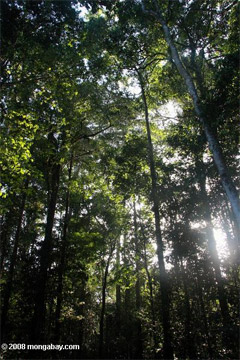Norway will provide up to $250 million to Guyana as part of the South American country’s effort to avoid emissions from deforestation.
Under the terms of the agreement, signed today, Norway will put $30 million into Guyana’s “REDD+” development fund. Subsequent payments — up to $250 million in total — would be contingent of Guyana’s ability to avoid future deforestation. Guyana’s deforestation is presently negligible, but the country has argued that proposed development projects could lead to an increase in logging and conversion for large-scale agriculture and plantations. It says the development fund will be used for sustainable development projects and climate change adaptation measures.
 Guyana Shield rainforest |
“We want to avoid the high-carbon development trajectory that today’s developed world followed,” said President Bharrat Jagdeo in a statement. “It will be impossible to defeat climate change if we don’t significantly reduce tropical deforestation. We said several years ago that the people of Guyana stood ready to play our part in determining how this can be done. We are delighted to work alongside Norway in searching for solutions that align the development aspirations of our people with the urgent need to protect the world’s tropical forests.”
“Through this partnership, we are building a bridge between developed and developing countries,” added Norway’s Minister of the Environment and International Development Erik Solheim. “We are giving the world a workable model for climate change collaboration between North and South. It’s not perfect, but it’s good, and it will be improved upon as we learn and develop together.”
Conservationists welcomed the deal.
“This is a historic agreement with great relevance to the decisions that must emerge from Copenhagen to ensure that nations with a great conservation history are rewarded for their continued commitment to protecting forests,” said Fred Boltz, Senior Vice President of Conservation International, an NGO that has worked closely with President Jagdeo in developing the country’s Low Carbon Development Strategy and forest carbon conservation program. “It is a visionary act, demonstrating the leadership of Guyana and Norway in ensuring the future of the Earth’s remaining wilderness areas – forests critical to resolving the global climate crisis and securing the future for all life on Earth.”
“This is a truly monumental agreement that has dramatic positive implications for rainforest countries around the world, and for the global climate,” added Russell A Mittermeier, President of Conservation International, in a statement. “It means a better future for the people of Guyana, and has major implications for other tropical rainforest countries as well.”
Norway has pledged more than 3 billion krone ($530 million) a year to saving forests. It has already committed more than 1.4 dollars to rainforest conservation in tropical countries over the past two years, including up to a billion dollars to Brazil’s Amazon Fund, $73 million towards the development and implementation of a national REDD strategy in Tanzania over the next five years, and more than $100 million to Congo Basin countries.
Related articles
Norway emerges as champion of rainforest conservation

(03/19/2009) While citizens in western countries have long paid lip service to saving rainforests, Norway has quietly emerged as the largest and most important international force in tropical forest conservation. The small Scandinavian country has committed 3 billion krone ($440 million) a year to the effort, a figure vastly greater than the $100M pledged — but never fully contributed — by the United States under the Tropical Forest Conservation Act (TFCA). Norway now hopes it can help push to include forest conservation in the successor to the Kyoto Protocol by providing funding and fostering cooperation among international actors like the UN and World Bank, as well as developing countries, to fund the creation of an international architecture which makes it possible to incorporate deforestation and degradation into a post-2012 climate regime.
Markets could save rainforests: an interview with Andrew Mitchell

(08/17/2008) Markets may soon value rainforests as living entities rather than for just the commodities produced when they are cut down, said a tropical forest researcher speaking in June at a conservation biology conference in the South American country of Suriname. Andrew Mitchell, founder and director of the London-based Global Canopy Program (GCP), said he is encouraged by signs that investors are beginning to look at the value of services afforded by healthy forests.
Guiana Shield forests help preserve biodiversity and climate
(06/09/2008) The Guiana Shield region of South America could play a significant role in efforts to fight global warming as part of a broader strategy to protect the world’s biodiversity hotspots and high biodiversty wilderness areas, said a leading conservationist speaking in Paramaribo, Suriname at a gathering of tropical biologists.

(04/02/2008) Last week London-based Canopy Capital, a private equity firm, announced a historic deal to preserve the rainforest of Iwokrama, a 371,000-hectare reserve in the South American country of Guyana. In exchange for funding a “significant” part of Iwokrama’s $1.2 million research and conservation program on an ongoing basis, Canopy Capital secured the right to develop value for environmental services provided by the reserve. Essentially the financial firm has bet that the services generated by a living rainforest — including rainfall generation, climate regulation, biodiversity maintenance and carbon storage — will eventually be valuable in international markets. Hylton Murray-Philipson, director of Canopy Capital, says the agreement — which returns 80 percent of the proceeds to the people of Guyana — could set the stage for an era where forest conservation is driven by the pursuit of profit rather than overt altruistic concerns.
Private equity firm buys rights to ecosystem services of Guyana rainforest
(03/27/2008) A private equity firm has purchased the rights to environmental services generated by 371,000 hectare rainforest reserve in Guyana. Terms of the deal were not disclosed, but the agreement is precedent-setting in that a financial firm is betting that the services generated by a living rainforest — including rainfall generation, climate regulation, biodiversity maintenance and water storage — will eventually see compensation in international markets.







